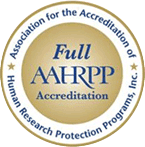Index
Invite the Human Subjects Office into Your Classroom for an IRB Overview Presentation
The IRB Welcomes New Faculty and Staff Researchers!
Conducting a Virtual or Electronic Consent (eConsent) Process for Human Subjects Research
Course-Related Student Project Policy and Checklist
Getting to Know the Delegate Permission System
IRB Advisor, August
In the News
Invite the Human Subjects Office into Your Classroom for an IRB Overview Presentation
Maegan Tyrrell, BA, CHES
Please note that the Human Subjects Office is working remotely through December 2020 and we would prefer to give virtual presentations. But we are willing to work with groups on a case by case basis to offer a presentation that will fit your needs.
IRB Overview Presentation
We offer a general IRB overview presentation that provides a broad overview of topics that are relevant for students and others who plan to conduct research themselves, whether as a course requirement or as an Honors or Master’s thesis or Doctoral dissertation. This presentation can cover some or all of the following:
- The definition of human subjects research
- How to ask if you need IRB approval
- Ethical conduct of research (the Belmont Report)
- The UI IRB review process
- Informed consent
- Research off campus or outside the United States
- Course-related student projects
- IRB Resources that are available for UI/VA researchers
The purpose of this presentation is to de-mystify the IRB review process and answer questions about conducting human subjects research. Whether your students are familiar with conducting research at the University of Iowa or they need basic information to get started, they are guaranteed to learn something new with our IRB overview presentation. Contact the IRB Education and Outreach Program to request a presentation.
The IRB Welcomes New Faculty and Staff Researchers!
Kelly O’Berry, BS, CIP
On behalf of the Human Subjects Office (HSO) and the Institutional Review Board (IRB), I extend a warm welcome to all new faculty and staff researchers! Every year, the UI hires 250-300 new faculty and approximately 28% of them will conduct research with human subjects, animals or bench science. The Office of the Vice President for Research offers many resources and collaborative opportunities to help new faculty researchers, research scientists and post-doctoral fellows begin their research here at the University of Iowa. [Read more] These resources include:
- Researcher Handbook - This electronic guide for all researchers (new and existing) provides guidance for the entire lifecycle of a research project. The Handbook explains how to get started, learn about all applicable regulations, apply for funding, manage awards, conduct research responsibly, hire and supervise staff and close down a research study when it ends and prepare for a researcher to leave the UI.
- New UI Faculty/Staff Researcher Survey - This web-based survey is a way for all researchers to begin the onboarding process with Research Administration and several other units on campus. It is not just for those who are conducting human subjects research. Based on responses in the survey, representatives from the following units will contact the researcher to provide guidance and support for transferring or beginning to conduct research at the UI:
-
- Office of the Vice President for Research (OVPR)
- Research Development Office (RDO)
- Division of Sponsored Programs (DSP)
- Human Subjects Office (HSO) and Institutional Review Board (IRB)
- Offices of Animal Resources (OAR) and the Institutional Care and Use Committee (IACUC)
- Environmental Health & Safety (EHS)
- University of Iowa Research Foundation (UIRF)
- Institute for Clinical and Translational Science (ICTS)
- Information Technology Systems (ITS)
There is additional information about the New UI Faculty/Staff Researcher Survey on the Human Subjects Office web site.
- New Faculty/Staff Researcher Orientation to the IRB - For new faculty planning to conduct research with human subjects, the HSO offers one-on-one or small group IRB orientations to help new faculty and staff researchers find the resources and support they need to get started with research involving human subjects. This session provides an orientation to:
- The Human Research Protection Program (HRPP)
- The IRB review process and requirements for submission
- Other committees or entities that review and approve human subjects research applications
- Important features of the eResearch application system (HawkIRB), including the delegate permission system and Principal Investigator oversight responsibilities
- Educational resources available for all human subjects researchers
The new faculty/staff orientation is a supplement to existing educational opportunities offered by the HSO and other offices in the HRPP and across campus, such as HawkIRB Training Sessions, IRB presentations, IRB Office Hours, and the Institute for Clinical and Translational Science (ICTS) Academy for Research Professionals.
Contact the IRB Education & Outreach team to learn about other educational resources for new (and not-so-new) faculty and staff researchers.

Conducting a Virtual or Electronic Consent (eConsent) Process for Human Subjects Research – NEW EDUCATIONAL TOOL!
Lisa Polakowski Schumacher, PhD
Virtual consent processes and electronic documentation of consent have evolved quickly in the COVID era. The technological adaptations have met the moment and will continue to shape how researchers obtain and document consent post COVID. The HSO has created a new educational tool called Alternatives to an In-Person Informed Consent Process for Non-FDA Regulated Studies. This new educational tool includes detailed best practices covering areas such as:
- Federal & State Regulatory References
- Video/Audio Tools to Conduct a Virtual Consent Process
- Electronic or Digital Signature Options
- Informed Consent Documentation Tools Available at the UI
- Required Descriptions in the HawkIRB application.
If you have questions about this new Educational Tool or any other Educational Tools available, please contact the Human Subjects Office via phone (319-335-6564) or email (irb@uiowa.edu).
Course-Related Student Project Policy and Checklist
Maegan Tyrrell, BA, CHES
If you are a professor teaching a research methods course with a requirement that students conduct a research project for educational purposes, you will want to review the IRB policy on course related student projects. This policy outlines the parameters for when these projects can be conducted without IRB review and approval (IRB Investigator’s Guide/Standard Operating Procedure, Section I, Part 12.D). The Course-Related Student Project Policy and Procedures educational tool can be found under the Educational Tools section of the HSO Website.
Course-related student projects are usually limited in scope and designed to teach students how to conduct research. They are not typically designed to further scientific knowledge in a field of study and are not intended to lead to a scholarly publication or presentation. The key criteria for course-related student projects include:
- Minimal risk to participants (not more than the amount of risk the participants face in their everyday lives).
- Study activities include surveys, interviews, focus groups, public observation or common educational practices.
- Results of the project are not shared outside the classroom for a poster, journal publication, presentation at a conference or other professional gathering and cannot be used for an Honors or Masters thesis or Doctoral dissertation. The only exception is when data are collected about an outside company, agency or organization and shared with that entity for internal quality assurance or quality improvement purposes only.
- Data collected would not negatively affect a participants’ reputation, employability, or social standing.
- No risk of criminal or civil liability.
- No monetary compensation from an outside entity for the collection, analysis or reporting of data.
- Participants are not prisoners or children.
- Project not conducted at the VA Health Care System.
Instructors and students should use the Course-Related Student Project Checklist to determine if the project can be done without IRB review and approval. This form can be found on the Resources for Students page of the HSO website. The checklist is a fillable pdf form and will indicate when IRB approval might be required. The student will then be directed to submit a Human Subjects Research Determination (HSRD) form for a determination whether IRB approval is required for the project. This form is available in eResearch (HawkIRB) system. It usually takes two to four business days to receive a determination.
You do not need to submit the Course-Related Student Project Checklist to the IRB. Instructors are authorized to determine if a course-related student project can be done without IRB approval based on their review of the completed Checklist. In the event IRB approval is required for a student project, it is important to plan accordingly as it can take 4-6 weeks for a new study to be reviewed and approved by the IRB.
If you have questions about the Course-Related Student Project policy, or if you need any assistance with the checklist, please contact the Human Subjects Office at 319-335-6564. You may also want to review the article about class presentations in this issue of the IRB Connection Newsletter.
Getting to Know the Delegate Permission System
Joanie (Neyens) Hoefer, BS, CIP
The delegate permission system allows Principal Investigators (PIs) to assign delegates to specific projects in HawkIRB. This is an especially useful tool for PIs who have multiple projects and several delegates.
Delegates in HawkIRB
PIs can name delegates to act on their behalf in HawkIRB. Delegates may enter, edit, and submit all the various types of application forms (i.e. New Project, Modification, Reportable Event, etc.) on behalf of the PI. If a PI chooses to appoint a delegate, they should establish documented procedures within their research group for the PI to review and approve the content of the forms prior to submission as the PI remains responsible for the completeness and accuracy of all forms submitted through HawkIRB.
Turning on the Delegate Permission System and Updating Delegate Permissions
When a PI adds a delegate in HawkIRB, the default setting gives that delegate access to all the PI’s projects. In order to allow or restrict access on a project by project basis, the PI must turn on the Delegate Permission System in their HawkIRB profile and then manually update their delegates’ permission designations.
- Select the “Personalize” tab in the black toolbar at the top of the screen in HawkIRB.
- Click on “Update My Profile”
- Select “Yes” under “Turn on the Delegate Permission System (allows you as a PI to assign permissions to projects for your delegates)”.
- Select “Update Fields” to save the change.
Once the Delegate Permission System has been turned on, the PI can then designate permissions for delegates on a project by project basis. - Under each delegate’s name, select the corresponding checkbox to grant access to specific projects. De-select the corresponding checkbox for projects a delegate should not access.
- Select “Save Permission Information”.
Please note that for any draft new project application, question I.1 must be answered for the project to be listed on the User Delegates screen (shown above). - The PI has the option of allowing their delegates to view all their projects even if they have restricted the delegate’s access. On the User Delegates page under “When a delegate opens your inbox”, select the “Show a full listing of projects including those that a delegate does not have permission to view (but suppress edit links)” option, and then select “Save Permission Information”.
The HawkIRB delegate logs into HawkIRB with their own HawkID and password. PIs should not give delegates their HawkID password! Once logged in, the delegate will click “delegate log in” in the upper right corner to access the PIs HawkIRB inbox.
This is how the PI’s inbox will look to the delegate who is able to view all the PI’s projects but has restricted access to some of them. Notice how the “review” and “remove” links do not appear for the project that this delegate cannot access.
Requesting to Revoke Delegate Permissions
This functionality is for delegates who are no longer working on a project and wish to have their delegate access removed for the project.
- Click on the “Personalize” tab on the black menu bar at the top of the screen.
- Click on the “Revoke my delegate permissions” link.
- Every PI will be listed with all the projects you have access to listed under their names. Check the boxes next to the projects for which you want to revoke delegate permissions.
- Click “OK” to confirm the opt out to notify the PI.
- Click the “Submit” button when you are done.
An automated email will be sent from the HawkIRB system to the PI, prompting them to remove your delegate permissions for the projects selected. You will be copied on this email. After the PI approves your request, you will receive another email saying that this request has been approved.
To permanently remove a delegate, follow the instructions for adding a delegate and click “Remove” to the right of their name. And then click “Save Permission Information.”
IRB Advisor, August 2020
Maegan Tyrrell, BA, CHES
IRB Advisor (a publication of Relias) is a monthly newsletter with articles about issues facing IRBs and individuals involved with human subjects research. Current and past issues of IRB Advisor are posted in the IRB ICON Course for Researchers which is accessible to anyone with an active UI HawkID. The portal to this ICON Course is on the Education and Training page of the Human Subjects Office website.
This month we are spotlighting articles from the August 2020 IRB Advisor Newsletter.
Diversity and Inclusion Go Beyond Race and Ethnicity
The All of Us Research Program prioritized enrolling racial, ethnic, and other minorities that, historically, have been underrepresented in clinical trials. The program set a goal of enrolling 1 million participants and increasing diversity in research. The researchers also prioritize enrolling participants from other minority groups, including:
- people with inadequate access to medical care.
- people with an annual household income below 200% of the federal poverty line.
- people who live in rural or non-metropolitan areas.
- people with less than a high school education or equivalent.
- people with cognitive or physical disabilities.
- people who are intersex or identify as a sexual minority.
Researchers should incorporate more diverse factors as key variables to ensure inclusion and identify barriers that limit research participation. A study that includes more variables related to underrepresented minorities of various types would have multiple benefits, such as more people feeling invited to participate due to an inclusive approach. Experienced researchers and IRBs can help lead the effort to improve enrollment diversity through example.
Research Group Increased Minority Participation by 533%
The Children’s Oncology Group, which represents more than 200 institutions worldwide, has helped to reduce the barrier of enrolling minority populations in clinical trials due to lack of resources. If there are very few patients, it’s harder to justify the resources to open many trials. The solution to this problem was to form a collaboration. Three hospitals in Chicago collaborated and developed inter-IRB agreements that allow the institutions to expedite enrollment in pediatric oncology trials. They relied on the National Cancer Institutes’ IRB of record. The goal is to improve access and outcomes for children with cancer. The program saw total studies open to enrollment increase by 100%. Enrollment of ethnic minorities rose by 533% and enrollment of Hispanic patients increased by 925%.
Other articles in this issue include:
- Research Community Seeks to Enroll More Minorities in Clinical Trials
- Keeping Open Dialogue Part of Virtual IRB Meeting Plan
- IRB Members Can Build Good Relationships in Virtual Space
- SBER Programs Face Challenges with Revised Common Rule
- FDA Releases Q&A for COVID-19 and Clinical Trials
In the News



